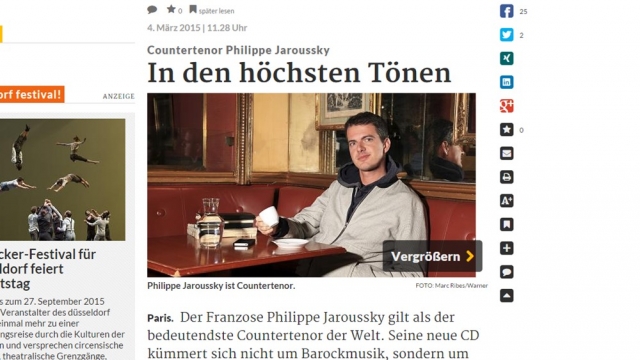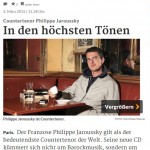2015-03-04, Rheinische Post Online
Mit fabelhafter Wandlungsfähigkeit dringt er in eine Welt vor, die Sänger seines Fachs bislang kaum je ergründen wollten: Vertonungen von Gedichten des Lyrikers Paul Verlaine. Das ist ein rekordverdächtiger Zeitensprung in den Salon, das Cabaret und die Kaschemmen im Paris des späten 19. und frühen 20. Jahrhunderts. Die zeitgleich unter dem Motto “Melodies françaises” erscheinende Platte heißt einfach “Green” – grün. “Das ist der Titels eines Lieds, das Debussy, Caplet und Fauré vertont haben, eines schöner als das andere, und auf keines wollte ich verzichten.”
Source/Read more: RP online
The following is not a professional translation; no profit is being made, no infringement of copyright is intended
To The Highest Heavens
Paris. The Frenchman Philippe Jaroussky is considered the greatest countertenor in the world. His new CD is not about Baroque music, but with music to poems by Frenchman Paul Verlaine. With these songs, he is on a tour. By Wolfram Goertz
What is a countertenor? To anticipate rumours and legends: They aren’t emasculated tenors. Neither are countertenors necessarily gay nor somehow effeminate. They are not singing conventional female parts because they feel like women, but because with a male voice, they have mastered the art to sound like certain artists at that time. A countertenor sounds like a castrato but retains his original physical condition.
On an internet video, Jaroussky’s singing and speaking voice can be compared:
Philippe Jaroussky, the splendid Frenchman, is the most famous of them all. In Baroque music, his voice is able to jubilantly soar, and pour out a light as intense as neon; but just as well he is able to embed his timbre in infinite sadness. His vibrato is precious and not loose. There are no wafting mists around his voice. What makes Jaroussky unique is the manner in which he unites ephebe clarity and raffinement. At 37 years, the singer is at the zenith of his career. In his trade, he is considered an Apollo.
His choice of location for the interview shows that he prefers to move casually in this parcour (“I am less and less eager for Baroque pieces by the dozen”). The “Le Floréal” is a moderately competently furnished bar, more a kind of a scene-hangout in the 10th arrondissement. In his hoodie, Jaroussky doesn’t really stand out. That he orders green tea with much honey to start with, proves him to be an artist with a focus on the health of his throat – and on the message.
With fabulous versatility, he enters a world that singers of his voice type hardly ever wanted to fathom before: settings to music of poems of the poet Paul Verlaine. It is possibly a record-breaking time-jump into the salon, the cabaret and the joints of the Paris of the late 19th and early 20th century. The album, simultaneously released under the motto “Melodies françaises” is simply called “Green.””It is the title of a song that Debussy, Caplet and Fauré set to music, one more beautiful than the other, and I didn’t want to go without any of them.”
Jaroussky’s throat had to deal with a lot already: Pergolesi’s edifying “Stabat Mater” and the jazzy, appealing Monteverdi CD-project “Teatro d’amore” by Christina Pluhar, Händel’s highly emotional opera “Agrippina” and the literature for castrati of the baroque composer Nicola Porpora, full of effects, are worlds apart. In the latter’s arias, the coloraturas reach the speed of a TGV leaving the near Gare du Nord. “But coloraturas are only of limited interest to me now,” Jaroussky reports, “pure virtuosity is not an ideal to make music by for eternity.”
The same goes for him. Every countertenor’s voice only needs some gentle pressure to produce an attack, expanding the head-voice to mix it with the chest register, and not to flip into pure falsetto. On the long run, this is a hellish chore. All the more pleasure Jaroussky feels when he is kicking open a door and conquers an unknown room. “There are so many exciting things in the music you would have to kick yourself for neglecting them.” Like very recently, in the opera “Niobe,” where Jaroussky leads Anfione, Niobe’s spouse, into a touching roller-coaster of feelings.
He devotes the weeks to come to concerts with the programme of his latest album. “Green” is Jaroussky’s most astounding project so far. Paul Verlaine was one of the most bizarre poets of literary history; several times he tried to strangle his mother and to shoot his colleague and friend Arthur Rimbaud; he came into conflict with the narcotics act, and was in prison. As a poet, Verlaine was an angel. “For me as a singer who likes it best to sing in French,” asserts Jaroussky, “his language is like mother’s milk.”
All the giants of the time felt the call of this strange world of poetry: Debussy and Fauré, Reynaldo Hahn and Charles Koechlin, Chabrier and Florent Schmitt, Saint-Saëns, Honegger and Varèse. The selection is proof that this tour d’horizon has been a fulfilling scavenger hunt for Jaroussky (“I followed some traces for Verlaine’s songs on youtube as well”). Even Georges Brassens and Charles Trenet – both alleged masters of the lighter art, Verlaine has spurred on to the highest artistic sense. In addition to the splendidly distinguished pianist Jérôme Ducros, the elite corps of the Quatuor Ebène play apart as well.
“Green” will soon start to show verdigris as well, because the master urges on. New plans are waiting, “and I absolutely have to study Bach.” He is dreading this a little. “German is a language that you should be in very good command of so the singer is not perceived as a foreign object.” And at the end of the long succession of rooms, there waits another door of his artistic existence: It leads to the conductor’s room. Even now, Jaroussky leads a chamber orchestra. A wise man makes provisions for the future: “Countertenor is not something you remain until you reach your age of retirement.”


